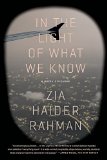Summary | Excerpt | Reviews | Beyond the Book | Readalikes | Genres & Themes | Author Bio

And then suddenly the man was on the ground. He was choking and coughing and clutching at his throat, the most hellish, rasping sound coming from his mouth.
The man in the leather jacket stood stunned. Zafar told him to listen.
I punched your friend in the throat, said Zafar. You can pick a fight with me or you can call for help and save your friend.
The man did not move.
Do you have a phone? he asked him.
The man nodded.
Zafar then touched my elbow and we carried on down the mews, at our backs the dreadful gasps of the man on the ground and his friend's gabbling into the phone. I was stunned.
Back on Portobello Road, I asked him if he thought they'd go to the police.
In court, it would be the word of two suits, two meek South Asians, against the word of bullyboy skinheads, one with a swastika and Combat 18 tattoos. What would they say? That we picked a fight?
We parted ways then. Only later, as images of that evening came back to me, certain questions presented themselves. Had Zafar sought to avoid the two men or had he in fact picked a fight? Had he turned into the quiet mews in order to evade the skinheads or to confront them?
That evening in 1996, I saw an aspect of Zafar that was new to me. But I didn't know what to make of it. What had happened seemed almost ridiculous, but it was real. If anyone had told me about it, I would have disbelieved him.*
* * *
As I write this, I see that Zafar's return on that September morning in 2008 was welcome not only because it stirred the embers of our early friendship, which had never ceased to glow, but also because it afforded me a chance to shift the focus of my own thoughts. Habits of mind are not easily broken from within. His arrival coincided with a time of reflection in my life, precipitated in some measure by the turmoil in the financial markets and the looming prospect of being called before a congressional or parliamentary committee, all of which had left me, as a junior partner in the firm, with feelings of helplessness. Such feelings are, I am sure, foreign to many men and women in my business, who, like matadors, acquire enormous self-belief from subduing the great beast, the bull or bear, that is the market. Yet in 2008, my dreams were not for greater wealth but for the recovery of a sense of control in my personal life.
To a large degree, my introspection grew with the increasing distance between me and my wife, a woman for whom I no longer felt any passion and for whom, at bottom, I struggled to find respect. When I met her, she had come to finance after a year of teaching in a school in a Kenyan township near Kisumu, by Lake Victoria. She spoke then of the children, whom she obviously loved. She told me of eight-year-old Oneka, who would valiantly thrust up his hand to answer a question put to the class, and when my wife acknowledged him with a nod, little Oneka would say, I don't know. She spoke of the children by name, she sent them cards, and she would tell me how much she wanted to go back and spend more time there, that she was going to squirrel away her earnings in finance for the freedom to do so soon. As our love blossomed, she became certain that when the day came, she would persuade me to go with her. But fifteen years later, with her idealism faded, she approached finance with the vigor of the convert. The last time our conversation had alighted on the topic of her days in Africa, of her dreams then, I caught in her eye the look of embarrassment. If that embarrassment had been for her failure to return to those children, I would have comforted her tenderly: Don't they say that when mortals make plans, the gods laugh? I saw instead that her embarrassment was for having ever felt so idealistic; it was scorn for her own naïveté.
Cold, unfeeling statistics tell us that marriages are now about as likely as not to end in divorce. Many of our friends were separating or had already divorced, but my wife and I had long regarded ourselves as shielded against whatever foul wind was driving apart so many couples around us. We even comforted ourselves with invented true stories of how those failed marriages had been doomed from the start, that this divorced couple had not had sufficiently similar interests, or that another had been doomed by a rivalry we believed we could detect from the very beginning.
Excerpted from In the Light of What We Know by Zia Haider Rahman. Copyright © 2014 by Zia Haider Rahman. Excerpted by permission of Farrar, Straus & Giroux. All rights reserved. No part of this excerpt may be reproduced or reprinted without permission in writing from the publisher.
We must believe in luck. For how else can we explain the success of those we don't like?
Click Here to find out who said this, as well as discovering other famous literary quotes!
Your guide toexceptional books
BookBrowse seeks out and recommends the best in contemporary fiction and nonfiction—books that not only engage and entertain but also deepen our understanding of ourselves and the world around us.